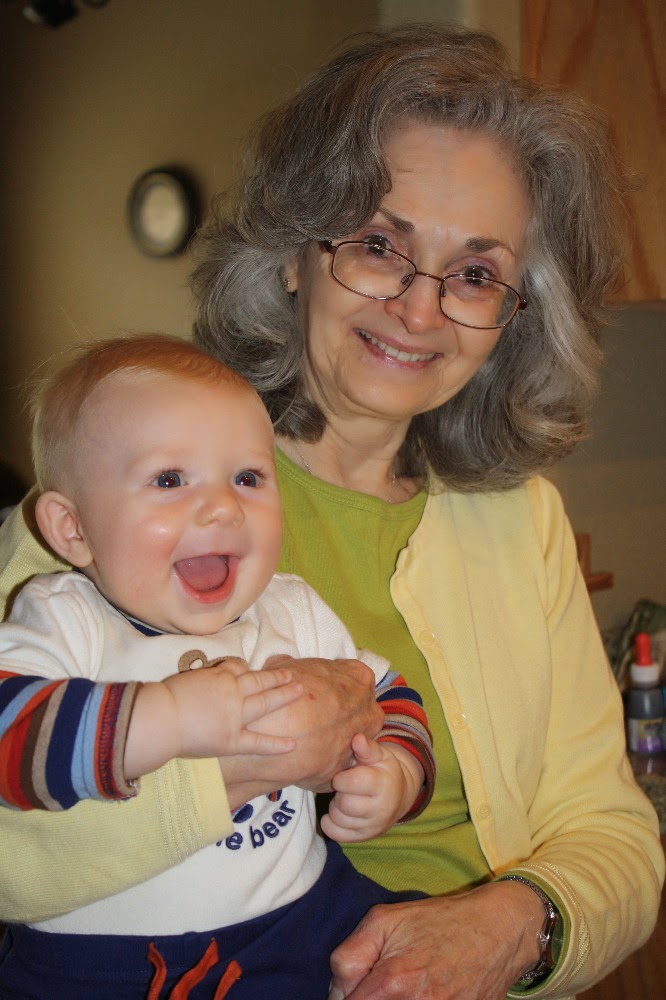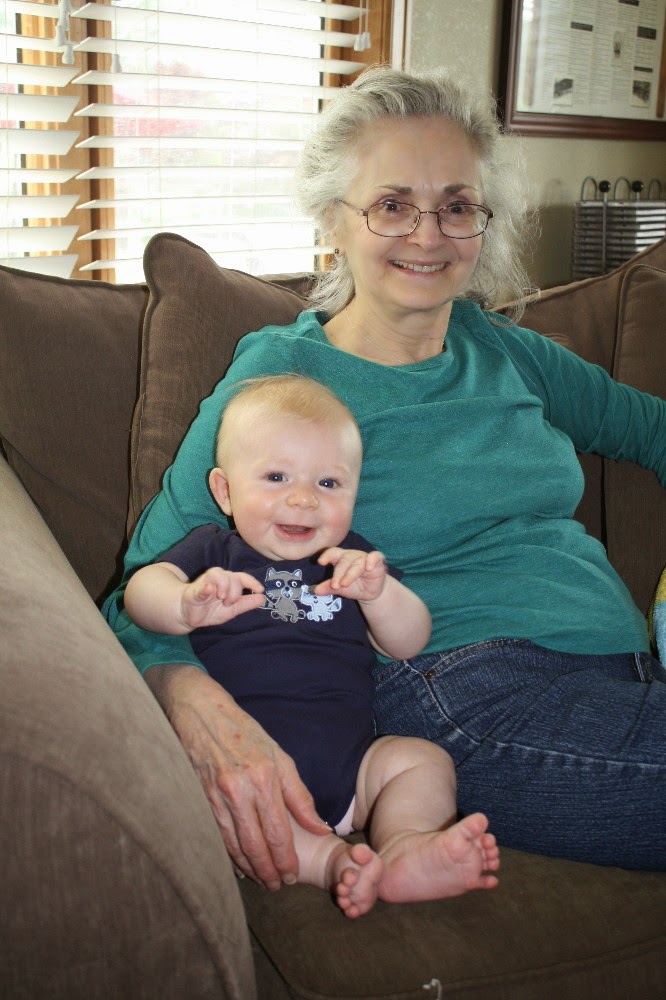 |
| Timothy and his grandma, May 2014 |
In less than two weeks, baby Timothy turns five months old. How time flies! It already feels as though he’s been a part of our lives forever. As I wrote a month ago, with my celiac disease and the fact that both of his sisters carry the celiac genes, he’s in an at-risk group for also developing celiac disease, which has us asking ourselves tough questions about how to minimize his risk, including whether to introduce him to gluten during a “magic window” he’s now in the middle of.
But Timothy’s not alone in the at-risk group. In fact, during this National Celiac Awareness Month, it was another family member—my mother—who became an example of how celiac disease can strike at any age and how first-degree relatives of those with celiac disease need to be aware. (Study after study, including these from 2003 and 2012, show that first-degree relatives have a celiac disease prevalence about five times higher than the general population.)
My mom is in her mid-60s—30 years my senior, just as I’m 30 years older than our first child, Marin. Ever since my own de facto celiac diagnosis in 2007, I’ve looked at my mom’s side of the family and suspected the possibility that others might also have celiac issues. Sensitive stomachs and irritable bowels run, so to speak, in the family. So do a number of other health conditions affecting my mother and other relatives, all potentially but not necessarily connected to a common thread of celiac disease, about which I’ll write next week.
Her immediate story, though, began with her annual physical in 2012. Routine blood tests showed her ferritin levels to be 27, within the normal range but toward the low end for the lab that did the analysis. One year later, in 2013, those ferritin levels had disconcertingly dropped in half to 15. She’d been on a vegetarian diet for nine months at that point, and she and her primary care doc attributed the ferritin drop due to her not getting heme iron from animal meat. My mom returned to eating meat and started taking supplements.
Earlier this year, though, her ferritin levels had only gotten worse: down to just 10. My mom’s primary physician suspected either absorption issues or a GI bleed, and referred her to a gastrointerologist for further evaluation.
With three years of blood work and her family history, the gastro felt my mom could potentially have celiac disease. I remember when she told me as much over the phone about a month ago. I felt an odd mix of surprise and “well, duh.” My family’s been amazingly supportive of my own celiac disease and gluten-free needs in ways words can never adequately express, but I’ve been something of an anomaly. Now, rather suddenly, what has been our family’s status quo for the past seven years was changing and another family member might be joining the celiac club.
More blood tests followed for my mom, this time looking at the anti-TTG IGA, a common and accurate screen for celiac disease. A normal value would have been less than 15. My mom’s results came in at 24.3.
That was enough to warrant scheduling an upper endoscopy and formal biopsy, still the gold standard of celiac diagnosis. The GI specialist, my mom noted, had observed atrophy of the lining of her duodenum (the first section of the small intestine) during the scope. Now it was just a matter of waiting for the biopsy results.
She got those results in a phone call while waiting to board an airplane in New York on her way to visit us in Colorado two weeks ago. One of the first things she said in the car on the way back to our house after I picked her up at the airport in Denver was, “The biopsy came back positive. I have celiac disease.”
“Welcome to the club!” I said.
A few nights later sitting at the kitchen table, I asked how much of an adjustment this would or wouldn’t be, getting diagnosed so late in life yet having a son and daughter-in-law who write gluten-free cookbooks.
“To be totally honest, getting diagnosed at this point in time under these circumstances was a great answer,” she told me. “The alternative, if this wasn’t it, wasn’t going to be a nice answer … hunting for something else to explain that low ferritin. That road was going to be far more scary and worrisome. This works, this is fixable, and I’ve learned so much over time watching you.”
Day to day, however, my mom is relatively asymptomatic, without the severe gastrointestinal symptoms that plague many with celiac disease, including me. That would pose its own challenge for her. “I’m going to have to make adjustments. With this firm diagnosis, I just can’t be ‘gluten-free.’ I have to be far more vigilant. To think that damage could be done and you don’t even know it, you have to be aware.”
She knows that recovery could take time. Her GI doc plans to retest the TTG antibodies in about three months to confirm those are dropping, and they expect the ferritin levels to recover slowly too, as her intestinal nutrient absorption improves.
In the meantime, our extended family becomes another anecdotal cautionary tale of the heightened celiac risk first-degree family members face. As National Celiac Awareness Month draws to a close later this week, talk to your family members about their risk, rather than your own celiac disease. The road to diagnosing additional cases of celiac disease in the family could start with something as simple as a basic blood screen during an annual physical they’d get anyway.
–Pete

Thank you so much for this–I’ve gone gluten free on an anti-inflammatory diet for osteoarthritis in my knee and with that and supplements and exercise have gotten so much better. Reading a lot about gluten sensitivity and celiac and then realizing that my granddaughter’s problems could be this…of course, the doctors didn’t pick it up, but we might have to ask for the appropriate blood tests, etc.
Anyway, all the information on your blog is extremely helpful. Thank you again!
Thank you so much for sharing this; your blog is very inspiring and helpful.
I’ve found that so often friends and family are the ones who (unwittingly) derail my diet. I recently found this (funny) open letter that I’ve shared with all my close gluten-eating friends and family to help them understand that for me, I need to honor my commitment to eating gluten-free. I thought you might appreciate it as well.
http://vitalbalanced.com/a-letter-from-a-gluten-free-dieter-to-gluten-eating-friends-and-family/
Thanks again for inspiring through your blog!